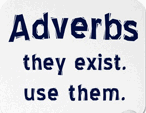|
|

The→THREE DISCOURSE PRINCIPLES ←[Advanced] •→INFORMATION ORDERING ⇔ [quiz] ←
• Here’s a great lesson on →DISCOURSE MARKERS← courtesy of Kenneth Beare, an ESL teacher, trainer, and content developer. He provides consulting services for English language learning projects through Englishfeed, as well as being the founder of Lingofeeds, dedicated to English for […]

•→Basic Sentence Parts← / •→The Parts of Speech←
•→ Randomly-Generated Sentences ←
¤ Basic sentence structure … ⇒[1] ⇔[2] ⇔ [3] ⇐ [syntax]
♦ → Word Order: ↑ Sentence Structure ↑ / ↓ Position of Adverbs ↓
¤ Word order quizzes: ⇒ [01] […]

¤ Finite & Non-finite Verbs ←[pdf]
¤ Auxiliary Verbs ⇐ «Auxiliaries are required with non-finite verbs. This is their role to mark non-finite verb forms for tense, aspect and voice, which non-finite verbs cannot express. Finite verbs mark these features on their own.»
(Bernard T. O’Dwyer, Modern English Structures: Form, Function)
[…]

•→www.chompchomp.com/terms/antecedent.htm⇐
•→Pronouns vs. determiners⇐
• quiz→
¤ DEMOSTRATIVES ‘THIS’ – ‘THAT’ ↓ ‘THESE’ – ‘THOSE’
¤ PERSONALS – POSSESSIVES
There’s a lot of English in this chart, with all these reference words.
I my mine me myself you your yours you yourself he his his him himself […]

•→Adjectives … lists ⇒[01] ⇔ [02]⇐ // •→Top 500 Adjectives⇐
⇒ QUIZ #1 ⇔ QUIZ #2 ⇐
∞ Collocations… Click on ⇒facilities⇐ Find the odd one out.
Φ Opposites … ⇒ [01] ⇔ [02] ⇔ [03] ⇔ [04]⇐
•→Softening ⇐[quizzes]
If you use a negative adjective, […]

♣ Negation ⇐(like asking) is one of the most difficult areas of English
•→ Double Negatives⇐[a feature of Spaniards and Blacks]
∇ Transferred Negation
When we express negative ideas with verbs like think, believe… we prefer to make the first verb negative instead of the second. We shift or transfer the […]

• Asking questions is another tricky area of English language. This →Anglo-link video lesson ←may give you some insights.
⇓ Another video tutorial by Katie [Beta College of English]
◊→ Intonation in questions ⇓
•→ Question Tags – Intonation ←
•→ Follow-up Questions ⇐
[…]

¤ Ways of saying . . . ‘YEP!’ ⇓
. . . ‘definitely‘ / ‘of course‘ / ‘sure‘ / ‘naturally‘ / ‘that’s right‘ / ‘I don’t mind if I do‘ / ‘by all means‘ / ‘you bet‘ / ‘you’re on‘ / ‘no problem‘ / ‘affirmative‘ / ‘absolutely‘ […]

♣ English Tenses & Aspects . . . →[Basic]← // →[Advanced]←
English tenses ⇑ ∞ Tense consistency …
Many learners get mixed up between these two expressions. Listen to Liliane’s free tutorial at Beta College of English ⇓
What’s important to remember: the forms ‘have/has got..’ are only […]

English has several forms which express future events. The form we choose depends on how sure we are that something will happen, whether we want something to happen, or whether we are talking about ourselves or others. ASPECT is much more important than TIME.
⇒Predictions/Statements of fact/Intentions/Arrangements/Scheduled events⇐
[…]

¤ ACTIVE & PASSIVE TENSES CHART… ⇒ [01] ⇔ [02] ⇐
We find an overabundance of the passive voice in sentences created by self-protective business interests, magniloquent educators, and bombastic military writers (who must get weary of this accusation), who use the passive voice to avoid responsibility for actions taken.
Thus «Cigarette ads were […]

Determiners are grammar words which come in front of nouns.
•→https://eslgrammar.org/determiner/⇐
Click icon to open a chart with the correct collocations of such words →
Pay attention to the kinds of nouns they go with: countable (singular? plural?) or uncountable?
∞ Quantifiers: ⇓ (a) few, (a) little…
•→Quantifiers: fill in the gaps⇐
•→Determiners […]

∴
A →quantifier ← is a type of determiner, such as all or many, that indicates quantity.
These items have been argued to correspond to logical quantifiers at the semantic level.
Some Notes on Quantifiers ⇓ [http://grammar.ccc.commnet.edu]
Like articles, quantifiers are words that precede […]

A reporting verb is a word which is used to talk about or report on other people’s work. Reporting verbs can be used to great effect, but the difficulty with using them is that there are many, and each of them has a slightly different and often subtle meaning. . […]

¤ FOR + -ing versus TO-infinitive ← ¤ Clauses of purpose
We use clauses of purpose to talk about people’s purposes, the reasons why they do things.
⇒ [quiz 01] ⇔ [quiz 02] ⇔ [quiz 03]⇐
⊗ The infinitive of purpose
The infinitive of purpose can only be used when […]

¤ Adverbs_of time ⇔ [quiz] ⇐
¤ Adverbs of frequency ↓ Position . . .
… always, usually, regularly, normally, often, sometimes, occasionally, rarely, seldom, hardly ever, never . . .
• before the main verb
Adverb of frequency Verb I always get up at 6.45. Peter can usually play football on […]

Prepositions ↑ from David Nicholson
‘ AT’ – ‘ON’ – ‘IN’
All these prepositions are used with expressions of both, time and place. Click below for collocations
•→ Prepositions of TIME ⇐
Notice we tend to use ‘at‘ with clock times and […]

A comprehensive Powerpoint presentation on all conditional structures.
Notice there’s an omission near the end (count no. 6:14)
The subject’s missing from the last example (i.e. subject pronoun «I»); ‘mixed conditionals’:
Wish + Past Participle → I wish I hadn’t drunk so much ←
Remember to pause the player when […]

Auxiliary, or helping verbs, are used before infinitives to add a different meaning. The following auxiliaries are called ⇒Modal Auxiliaries or Modals⇐
Modal Auxiliaries Meanings / Functions can ability, permission, request, possibility could ability, formal request, possibility shall futurity, willingness, intention, suggestion, insistence should obligation, necessity, expectation, advisability will willingness, intention, prediction, […]
|
|


















